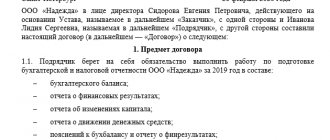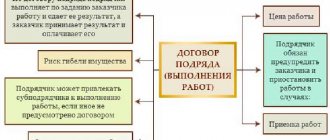| The commercial activities of any construction organization are based on various types of civil law contracts. The central place among them is occupied by the construction contract. | Articles on the topic: -Construction agreement: price and payment procedure -Construction: compensation for harm -Bankruptcy of the developer |
The legal service of an organization needs to be very careful when agreeing on the terms of this type of agreement in order to eliminate the possibility of adverse consequences for the organization. The most important conditions will be discussed in this article.
Essential terms of a construction contract.
The definition of a construction contract is given in paragraph 1 of Art. 740 of the Civil Code of the Russian Federation: the contractor undertakes, within the period established by the contract, to build a certain object on the instructions of the customer or to perform other construction work, and the customer undertakes to create the necessary conditions for the contractor to carry out the work, accept their result and pay the agreed price. Based on this, we can conclude that the essential terms of a construction contract are the subject and term.
The subject of this agreement is the performance of work on the construction or reconstruction of an enterprise, building (including a residential building), structure or other facility, as well as the performance of installation, commissioning and other work inextricably related to the facility under construction. The rules on construction contracts also apply when carrying out major repairs of buildings and structures, unless otherwise provided by the contract (clause 2 of Article 740 of the Civil Code of the Russian Federation).
The subject matter must be properly defined, otherwise the contract may be declared invalid. This conclusion was made in the Resolution of the Second Arbitration Court of Appeal dated September 10, 2009 No. A17-1771/2009. The court indicated that the contract No. 4 dated December 1, 2007 did not fully define the scope and content of the work (there are no technical documentation and estimates). Analysis of this contract did not allow us to reliably establish what the customer’s task actually was. Appendix 1 (which is an integral part of the contract) was only a protocol of the contract price, in which the cost of 1 cubic meter of masonry was agreed upon. m of brick. The handwritten entry did not make it possible to establish by whom and under what circumstances it was made and whether it was agreed upon with the persons who signed the document. In addition, the controversial handwritten note in any case cannot replace the technical documentation required when concluding a construction contract, which must indicate the types and volumes of work performed. Thus, due to the impossibility of reliably determining the subject of the contract, the specified contract was recognized as not concluded.
Example 1.
Let’s say that a construction organization, when constructing a multi-story residential building, needs to hire a third-party company to install windows. In this case, the subject of the construction contract can be formulated as follows:
The Contractor undertakes, on the instructions of the Customer (in accordance with the approved design documentation and specifications), at his own expense (from his materials, with his own resources and resources), to manufacture, supply, install, adjust polyvinyl chloride products (windows, balcony doors, loggia windows) for the construction of a residential house No. 1 (address according to the general plan), located on Geroev Avenue, 1, in the Sovetsky district of the city N (hereinafter referred to as the work), in accordance with the terms of this Agreement, and the Customer undertakes to accept the result of the work and pay the price stipulated by this Agreement.
The result of the work under this Agreement is assembled and ready-to-use polyvinyl chloride products (windows, balcony doors, loggia windows).
Place of work: Russia, city N, Sovetsky district, Geroev Avenue, 1, construction of residential building No. 1 (address according to the general plan) (hereinafter referred to as the Object).
The requirements for the performance of work are reflected in the specification (Appendix 1 to the Agreement, which is an integral part thereof) and the approved design documentation of the Facility, transferred to the Contractor under the acceptance certificate (Appendix 2 to this Agreement, which is an integral part thereof).
In accordance with paragraph 1 of Art. 708 of the Civil Code of the Russian Federation, the contract indicates the initial and final deadlines for the work. By agreement between the parties, the contract may also stipulate deadlines for completing individual stages of work (interim deadlines). Article 190 of the Civil Code of the Russian Federation indicates that the period established by law, other legal acts, a transaction or appointed by the court is determined by a calendar date or the expiration of a period of time, which is calculated in years, months, weeks, days or hours.
Example 2.
In the contract we are considering, the term for the completion of work can be formulated as follows:
The work under this Agreement must be completed in full and handed over to the Contractor in accordance with the terms of this Agreement, the requirements of the specification and design documentation of the Facility within the following deadlines:
- start of work – September 1, 2011;
- Completion of work – December 31, 2011
Extension of the deadlines for completing work is possible only due to force majeure circumstances.
The date of completion of the work is considered to be the date of signing by a commission consisting of representatives of the Customer and the Contractor of the work acceptance certificate.
The terms specified in the Agreement are the starting point for calculating the penalty in the event of failure by the Contractor to fulfill its obligations under this Agreement.
A deadline can also be determined by indicating an event that must inevitably occur.
Quite often, the parties to the contract determine the initial period by the moment the customer makes the advance payment. Until recently, courts in such cases recognized the term clause as inconsistent and the contract as not concluded. However, the Presidium of the Supreme Arbitration Court in Resolution No. 1404/10 dated May 18, 2010 in case No. A40-45987/09-125-283 indicated: if the initial moment of the period is defined as the action of a party or other persons, including at the time of payment of the advance, and such actions completed within a reasonable time, uncertainty in establishing the deadline for the work is eliminated. Therefore, in this case, the condition on the period of performance of the work must be considered agreed upon, and the contract must be considered concluded.
The interpretation of legal norms contained in this Resolution of the Presidium of the Supreme Arbitration Court is generally binding and is subject to application by arbitration courts when considering similar cases.
Usual terms and conditions of a construction contract.
The price clause is not an essential condition of a construction contract, unless the parties have agreed to recognize it as such.
According to Art. 746 of the Civil Code of the Russian Federation, payment for work performed by the contractor is made by the customer in the amount provided for in the estimate, within the time frame and in the manner established by law or the construction contract. In the absence of appropriate instructions in the law or contract, the customer is obliged to pay the contractor the agreed price after the final delivery of the work results, provided that the work is completed properly and on time or with the customer’s consent ahead of schedule.
A construction contract may provide for payment for work at a time and in full after acceptance of the project by the customer. In accordance with clause 8 of the Letter of the Presidium of the Supreme Arbitration Court of the Russian Federation dated January 24, 2000 No. 51 “Review of the practice of resolving disputes under a construction contract,” the basis for the customer’s obligation to pay for the work performed is the delivery of the result of the work to the customer.
Quite often, the customer insists on the inclusion in the contract of a warranty retention clause, according to which he retains part of the price of the work in the form of ensuring the proper fulfillment by the contractor of its obligations regarding the quality of the work performed. This amount is paid to the contractor subject to the elimination of comments on the work performed or in the absence of comments during the warranty period.
Guarantee retention, of course, is not a type of such method of ensuring the fulfillment of obligations as retention, however, as mentioned above, the Civil Code of the Russian Federation provides for the possibility of determining the procedure for payment for work performed by the construction contract itself. Therefore, this condition does not contradict the law, which is confirmed in judicial practice.
In particular, in the Resolution of the Federal Antimonopoly Service dated August 26, 2010 No. A65-20024/2009, the court indicated that, in accordance with paragraphs 1 and 4 of Art. 421 of the Civil Code of the Russian Federation, citizens and legal entities are free to enter into an agreement. The terms of the agreement are determined at the discretion of the parties, except in cases where the content of the relevant condition is prescribed by law or other legal acts (Article 422 of the Civil Code of the Russian Federation). In the contract under consideration, the parties provided for the procedure for payment for work, as well as a 5% withholding for the warranty period for a period of 14 months from the date of approval of the acceptance certificate for the completed object by the acceptance committee. The appellate court rightfully recognized the condition of the contract to withhold 5% of the contract price as related to the payment procedure, which does not contradict the provisions of paragraph 2 of Art. 746 of the Civil Code of the Russian Federation.
Let us note that earlier court decisions expressed a different position. Thus, the Resolution of the Federal Antimonopoly Service of the Moscow Region dated November 28, 2005 No. KG-A40/11581-05-P-1.2 stated that the condition of the contract is to pay for the work performed by the contractor and accepted by the customer with the latter retaining 5% of the cost of the work to cover possible expenses caused improper fulfillment by the contractor of warranty obligations under the contract, contradicts the content and meaning of Art. 359 and 740 of the Civil Code of the Russian Federation. In this regard, the court concluded that this condition of the contract is not subject to application, and the rights of the customer are not subject to judicial protection.
Example 3.
The contract may provide for the following payment procedure:
The price of the Agreement is RUB 5,000,000. (five million rubles), including VAT (18%), subject to production, delivery, installation, adjustment of 1000 sq. m of windows, balcony doors (hereinafter referred to as OK) at the Facility and 1000 sq. m of loggia windows (hereinafter referred to as OL) and is calculated based on:
- 3000 rub. for 1 (one) sq. m mounted at the OK Object;
- 2000 rub. for 1 (one) sq. m mounted at the Object OL.
The specified price of the Contract includes the cost of manufacturing, delivery, installation, adjustment of OK and OL at the Facility, performance of related (including preparatory) and other works, as well as the amount of all taxes, fees, customs duties, other obligatory payments, compensation for other costs provided for by the legislation of the Russian Federation, etc., that is, it is firm and final.
Payment for work performed is carried out by bank transfer by payment orders by transferring funds by the Customer to the Contractor's bank account specified in this Agreement in the following order:
- The Customer transfers to the Contractor an advance in the amount of RUB 3,000,000. (three million rubles) within 15 (fifteen) days from the date of signing the Agreement with subsequent offset of the advance payment when making the final payment under this Agreement;
- the final payment under this Agreement is carried out within 15 (fifteen) days from the date of signing by the Parties of the acceptance certificate for the work performed (without claims) minus the amount of the advance payment. In addition, payments (final settlement under this Agreement) are made minus the amount of the guarantee retention (in the amount of 10% of the amount of work performed specified in the acceptance certificates), which is retained as security for the proper performance by the Contractor of its obligations under the Agreement for a period of one a month from the moment the Facility is put into operation and transferred to the owners of the Facility premises (the designated period of warranty retention also includes the period of time from the moment of signing the acceptance certificates for the work performed until the Facility is put into operation and transferred to the owners of the Facility premises). This amount is paid to the Contractor subject to the elimination of comments on the work specified in the relevant acts, or in the absence of designated comments.
The work is paid by the Customer in accordance with the volumes actually completed.
If the Contractor's details specified in this Agreement are changed, the Contractor notifies the Customer of this within one day with an official document signed by the manager and chief accountant and certified by the seal. Otherwise, all risks, including those associated with the Customer’s transfer of funds to the Contractor’s account specified in this Agreement, are borne exclusively by the Contractor.
Payment documents issued to the Customer must necessarily contain references to primary documents, as well as documents confirming the Contractor’s fulfillment of obligations. The date of payment is the day the funds are received into the Contractor's bank account. The Customer has the right to delay the transfer of funds to the Contractor for work performed in the event of failure to eliminate defects identified during acceptance of the work performed.
The concept of “misconception” and its origins
According to Alexander Zezekalo, when we talk about delusion (error in its broadest sense), we mean a false idea about something. It is important to remember that in law, error acts as one of the vices of the will.
“The very possibility of challenging a transaction under the influence of a misconception has received and is receiving an ambiguous assessment from lawyers. Some see this as a completely natural consequence of the fact that we consider a transaction as an act of will. If the will did not correspond to its expression, then such a transaction can and should be challenged. Other experts see a threat to the stability of civil circulation, because what was expressed aroused the trust of other persons, the trust of the circulation. Supporters of both positions are united in the fact that challenging a transaction made under the influence of a mistake is possible only with exceptions limited by law,” the lawyer emphasizes.
However, such a possibility in law is not new. As Alexander Zezekalo notes, Roman jurists dealt with this problem. For example, the digests describe how they tried to find an acceptable solution and answer the question: what would be the consequences of a transaction under the influence of error (when, for example, copper was sold instead of gold)? Subsequently, the development of this topic only gained momentum.
“The doctrine of error occupies a prominent place in European doctrine. And therefore, today many European legal orders (primarily the continental legal system) contain a provision on the possibility of recognizing a transaction made under the influence of a mistake as invalid. Russia is no exception in this sense - we also have such rules. At the same time, they continue to improve,” explains Alexander Zezekalo.
Providing construction materials.
According to Art. 745 of the Civil Code of the Russian Federation, the obligation to provide construction with materials (including parts and structures) or equipment is borne by the contractor, unless the construction contract stipulates that the customer will provide the construction in whole or in a certain part. This condition also needs to be given close attention, since the party whose responsibilities include ensuring construction is responsible for the discovered impossibility of using the materials or equipment provided by it without deteriorating the quality of the work performed, unless it proves that the impossibility of use arose due to circumstances for which the other is responsible. side.
Therefore, the contract must determine the party who is responsible for providing construction with materials and equipment, and the procedure for paying for them. Otherwise, difficulties may arise in protecting the rights of the relevant party.
For example, in the Resolution of the Federal Antimonopoly Service No. A53-14938/2009 dated June 10, 2010, the court indicated: the plaintiff’s demands for the recovery of 75,154 rubles. (the cost of materials spent on poorly performed construction work) were claimed by the plaintiff without any justification, since it is not clear from the terms of the contract concluded by the parties that the responsibility for ensuring construction lies with the customer. On the contrary, the contract in question states that the contractor is purchasing materials, and the customer undertakes to pay for the work, the cost of which is determined in the estimate taking into account the cost of the materials.
We note that in accordance with paragraph 3 of Art. 745 of the Civil Code of the Russian Federation, in the event of the impossibility of using materials or equipment provided by the customer without deteriorating the quality of the work performed and the customer’s refusal to replace them, the contractor has the right to refuse the construction contract and require the customer to pay the contract price in proportion to the completed part of the work.
Example. The provision for providing construction with materials and equipment in the contract can be formulated as follows:
The Contractor provides construction materials, products and structures, and other engineering equipment.
All materials and equipment supplied for construction must have appropriate certificates, technical passports and other documents certifying their quality.
Acceptance, unloading and storage of materials and equipment arriving at the Site in pursuance of the Contract is carried out by the Contractor.
Responsibility for the safety of all materials and equipment supplied for the implementation of the Contract until the complete completion of the work (including the period of time during which the Contractor will eliminate deficiencies identified during acceptance, dismantle temporary structures erected by him, and also remove construction equipment and mechanisms located on the construction site , equipment, garbage left after the work) is borne by the Contractor.
The Contractor is responsible for the compliance of the materials and equipment used with state standards and technical specifications and bears the risk of losses associated with their inadequate quality, non-compliance with state standards, technical specifications and other similar requirements.
Monitoring the progress of work.
Construction is a complex and responsible process, so the customer must monitor the contractor’s activities and promptly respond to deviations from the order of work. Article 748 of the Civil Code of the Russian Federation gives the customer the right to exercise control and supervision over the progress and quality of work performed, compliance with deadlines for their completion (schedule), the quality of materials provided by the contractor, as well as the correct use by the contractor of the customer’s materials, without interfering with the operational and economic activities of the contractor.
Example 4.
This condition in a construction contract can be formulated as follows:
The quality of the work performed must comply with the requirements of current GOSTs, SNiPs, TUs, other regulatory and technical documents, approved design documentation and specifications.
The Customer has the right to appoint his representative at the construction site, who, on behalf of the Customer, together with the Contractor, will draw up certificates for the work performed, carry out technical supervision and control over the execution of work, and also check the compliance of the materials and equipment used by the Contractor with the terms of the Contract, the project documentation of the Facility and specifications .
The Customer's representative has the right to unhindered access to all types of work at any time during the entire period of work.
The work must be performed by the Contractor in strict accordance with the deadlines established in this Agreement.
The Contractor independently organizes the execution of work at the Facility according to its plans, in accordance with the deadlines for completing the work established by this Agreement. Ensuring general order during the performance of work at the Facility, removal of construction waste from the construction site of the Facility during the period of work is the responsibility of the Contractor.
During the construction process, the Contractor is obliged to use only those materials that are specified in the design documentation of the Facility or agreed with the Customer.
If the Customer rejects in writing the use of materials that do not meet quality standards and the terms of the Contract, the Contractor is obliged, at his own expense and on his own, to replace them with other materials taking into account the Customer’s requirements, taking into account that such replacement should not increase the time required to complete the work. .
During the execution of work, the Customer has the right to issue motivated orders to the Contractor in writing regarding:
- replacement of low-quality materials;
- termination of any work by the Contractor if it does not comply with the documentation, SNiPs and the requirements of the current legislation of the Russian Federation;
- reworking works to ensure their proper quality.
Three days before the start of acceptance, the Contractor notifies the Customer in writing about the readiness of individual critical structures and hidden work.
If the Customer discovers poorly performed work, the Contractor, on his own and at his own expense, is obliged to redo this work within the period specified by the Customer to ensure its proper quality. If the Contractor fails to fulfill this obligation, the Customer has the right to engage another organization to correct poorly performed work and pay the costs at the Contractor’s expense.
Other nuances
For example, it is worth stipulating in the contract the living conditions of the construction team during the work, as well as the professional suitability of the personnel and the number of people who will work on the site.
It is also worth thinking about access routes to the site. If the road to your future home is bad, but you did not tell the contractor about it in advance, this can lead to a number of problems. You may be required to pay additional fees, or in the worst case, materials will not be delivered at all. All this must be discussed in advance and recorded in the contract.
Procedure for delivery and acceptance of work.
The general rules for delivery and acceptance of completed work are established in Art. 753 of the Civil Code of the Russian Federation. In accordance with it, the customer, having received the contractor’s message about the readiness for delivery of the result of the work performed under the construction contract or (if provided for by the contract) of the completed stage of work, is obliged to immediately begin accepting it. As a general rule, the customer organizes and accepts the result of the work at his own expense.
The delivery of the work result by the contractor and its acceptance by the customer are formalized by an act signed by both parties. If one of the parties refuses to sign the act, a note to this effect is made in it and the act is signed by the other party.
Resolution of the State Statistics Committee of Russia dated November 11, 1999 No. 100 approved unified forms of primary accounting documentation for recording work in capital construction and repair and construction work (put into effect from January 1, 2000), including forms No. KS-2 “Acceptance Certificate of Work Completed” ", No. KS-3 "Certificate of the cost of work performed and expenses."
In accordance with the Instructions for the use and completion of these unified forms (Letter of Rosstat dated May 31, 2005 No. 01-02-9/381), form No. KS-2 is used for the customer’s acceptance of completed contract construction and installation work for industrial, housing, civil and other purposes . For settlements with the customer for work performed, form No. KS-3 is used.
If the customer believes that the work does not meet the quality requirements established by the contract, he may refuse to sign the act. But the refusal must be motivated, otherwise the court may oblige the customer to pay for the work.
In particular, the FAS Far Eastern Military District, in Resolution No. F03-1529/2011 dated 05/03/2011 in case No. A51-8880/2010, established that the contractor, having completed the work stipulated by the transactions, sent to the defendant certificates of completion of work in form No. KS-2, which last received. However, the customer did not sign these acts, did not present any objections or claims regarding the quality, volume and cost of the work, and did not motivate his refusal to sign the documents. Under such circumstances, the court recognized the unilateral acts of completed work as complying with the norms of civil law and considered the fact that the contractor performed the work under the disputed work contracts to be established. As a result, the court pointed out that the customer had an obligation to pay, which he did not fully fulfill.
A unilateral act of delivery or acceptance of the result of work can be declared invalid by the court only if the reasons for refusing to sign the act are justified. Thus, the FAS ZSO in Resolution No. A46-13537/2009 dated November 23, 2010 recognized the refusal of the defendant (customer) to sign acts in form No. KS-2 as justified due to the lack of information in them about what work and in what volume were presented for acceptance . The court indicated that they cannot serve as a basis for making demands for payment for work.
The customer has the right to refuse to accept the result of work if deficiencies are discovered that exclude the possibility of its use for the purpose specified in the construction contract and cannot be eliminated by the contractor or customer.
Example 5.
In the contract, the acceptance procedure can be defined as follows:
The Contractor presents to the Customer a certificate of work performed, drawn up in form No. KS-2, approved by Resolution of the State Statistics Committee of Russia dated November 11, 1999 No. 100, and a certificate of the cost of work performed and expenses, drawn up in form No. KS-3, approved by the above-mentioned Resolution, indicating volumes of work, as well as as-built documentation for the scope of work completed no later than the moment the completed work is presented for delivery.
The Customer, having received the Contractor’s message about readiness for delivery of the result of the work performed under this Agreement, is obliged to begin accepting it within two working days.
Acceptance of completed construction work must be carried out by a commission consisting of representatives of the Customer and the Contractor.
The delivery of the work result by the Contractor and its acceptance by the Customer are formalized by an act signed by authorized representatives of the Parties. If one of the Parties refuses to sign the act, a note to this effect is made in it and the act is signed only by the other party.
If during the acceptance of work defects in materials, equipment, parts and assemblies are discovered, or if the work performed at the Site does not meet the requirements of the Contract, SNiPs, specifications and design documentation, the Contractor eliminates such defects or makes an appropriate replacement at its own expense within the time period specified by the Customer. If the defect cannot be corrected, it must be compensated 100% (one hundred percent).
Two days before the start of acceptance, the Contractor notifies the Customer in writing about the readiness of individual critical structures and hidden work.
Their readiness is confirmed by bilateral acts of intermediate acceptance of critical structures and hidden work.
The Contractor begins to perform subsequent work only after the written permission of the Customer.
If the closure of the work is carried out without the confirmation of the Employer, the Contractor is obliged, at his own expense, to open any part of the hidden work as directed by the Employer, and then restore it.
The work under this Agreement is considered completed only after the Contractor has transferred to the Customer all the necessary as-built documentation for the work performed, documents confirming the quality of the materials used (if they were provided by the Contractor), in full according to the acceptance certificate signed by the Parties.
The Customer appoints his representative during construction, who, on his behalf, together with the Contractor, carries out acceptance of the work performed according to the certificate, technical supervision and control over their implementation and quality, and also checks the compliance of the materials and equipment used by the Contractor with the terms of the Contract and the approved project documentation of the Facility.
The Customer's representative has the right to unhindered access to all types of work at any time during the entire period of work under the Contract.
Final acceptance of work under the Contract is carried out in accordance with the established procedure by the acceptance committee with the participation of authorized representatives of the Contractor and the Customer.
The expiration of the Agreement does not relieve the Contractor from liability for violation of its terms.
Management and administration
Construction contracts traditionally contain general and special provisions. The latter are formulated individually in each specific case and we can say that they have priority. However, this does not mean that the group of general provisions does not carry weight. Among them are such significant “points” as:
- subject and object of the contract;
- work performed by the contractor;
- price and payment;
- termination of contract;
- guarantees and insurance;
- other “standard” conditions.
“If we look at how an organization manages complex construction contracts, there are generally two roles that are key to contract management. The first role is the role of the person who manages the contracts, and the second is the person who administers the contracts. The difference between management and administration is that management involves making decisions on key issues in the execution of a contract. It is typical for a contract administrator to monitor any deadlines during the execution of a contract, maintain correspondence with an authorized person of the contractor and send him notifications, monitor the timeliness of provision of bank guarantees, guarantees of parent companies, and so on,” notes Stanislav Duryagin.
Finally, the last thing worth focusing on are contract models. They are determined by the services that the contractor provides.
- The EP (Engineering + Procurement) contract model assumes that the contractor carries out the design and supply of equipment.
- The EPC (Engineering + Procurement + Construction) contract model is similar to the EP model, but construction and commissioning are added to the contractor’s tasks.
- In the EPS (Engeneering + Procurement + Services) contract model, technical services, such as installation supervision, are added to the EP model.
- The EPCM (Engeneering + Procurement + Construction Management) contract model is not a contract, but a consulting contract.
- The EPCCM (Engeneering + Procurement + Construction + Construction Management) contract model essentially copies the EPC model, adding construction management to it.









